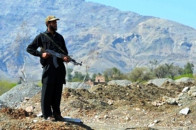Cabinet moves to appease farmers
Flour mills face licence revocation for non-compliance in purchase

In a bid to defuse mounting unrest among Punjab's farming community, the provincial cabinet, chaired by Chief Minister Maryam Nawaz Sharif, rubber-stamped a series of interventions during its 25th meeting on Wednesday.
Yet farmer leaders dismissed the package as too little, too late, warning that the measures would do little to alleviate growers' profound financial losses.
Highlighting the session's marquee decision, the cabinet approved an amendment to the Food Grains (Licensing Control) Ordinance, 1957. Under the new rules, all licenced flour mills must purchase at least 25%? of their wheat requirements directly from registered farmers.
Mills failing to comply face revocation of their operating licenses. Simultaneously, the government moved to deregulate wheat procurement, lifting previous restrictions on private sector buying in an effort to widen market access for growers.
To address the perennial liquidity squeeze at harvest season, the cabinet endorsed implementation of an Electronic Warehouse Receipt (EWR) system. Farmers will be able to deposit their wheat in certified warehouses and obtain bank loans up to 70% of the stored grain's value. The provincial government will underwrite initial storage charges, allowing growers to defer sales until market prices improve.
The CM underscored the need to translate agricultural research into tangible benefits. She directed that all outstanding payments under provincial water supply and irrigation schemes be disbursed without delay, warning that farmers' productivity hinges on reliable irrigation infrastructure.
The government's interventions, however, drew criticism from Punjab's principal farm lobby. Pakistan Kissan Ittehad President Khalid Mehmood Khokhar lamented the absence of a guaranteed support price. "Our core demand has always been a minimum purchase price that at least covers our cost of production," he said.
"With no floor price announced, farmers have been forced to sell much of their wheat at rates far below cultivation expenses. This package arrives after the damage is done."
Khokhar put the sector's cumulative losses for the current season at Rs1,106?billion, declaring, "By the time these measures take effect, the harvest is gone. Growers will not trust Punjab's leadership again next year."
He also accused ruling party legislators of remaining silent on the crisis, describing the cabinet's proposals as politically motivated but practically ineffective.
Agriculture was only one item on a sweeping agenda. The cabinet authorized funding to convert the Children's Library Complex in Lahore into an early-education centre named after Nawaz Sharif, and approved the deployment of eco-friendly electric buses in major Punjabi cities.
Environmental initiatives included merging the Environment Policy Centre with the Environment Technology Centre to form a Climate Policy and Technology Centre.
Infrastructure approvals ranged from jeepable tracks in the Koh-e-Sulaiman area to new lodging facilities at Nishtar Park Sports Complex.
A reserve-price auction framework for placer gold along the Indus River in Attock was also endorsed.
Labour and social welfare reforms featured prominently: the assembly ratified amendments to the Punjab Motor Vehicle Rules to regulate rickshaw operations, expanded social security coverage under the Punjab Workers Social Security Ordinance, and delegated Additional Sessions Judges the powers of consumer courts. A draft Punjab Labour Code 2024covering construction, agriculture, and allied sectorsreceived cabinet approval, while funding was allocated for tertiary care hospital equipment and medicines across the province.
In a bid to boost crop yields, the cabinet approved an MoU between Punjab's Ayub Agricultural Research Institute and China's Anhui Academy of Agricultural Sciences. The agreement will facilitate introduction of hybrid rice seeds suited to local conditions.
Amendments to the Police Station Computerization Project and other digital-governance schemes were also ratified.
With the wheat procurement measures now enshrined in law, the government faces a critical test: translating policy into timely payments and reliable markets for Punjab's farmersand winning back their confidence.




















COMMENTS
Comments are moderated and generally will be posted if they are on-topic and not abusive.
For more information, please see our Comments FAQ